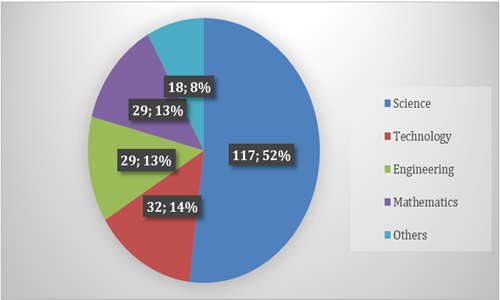
Gender Participation in Tertiary STEM Education in Nigeria: Examining the Current Perspectives
Abstract
Keywords
Full Text:
PDFReferences
Adam, U. (2019) Potency of Culturo-Techno-Contextual Approach on Students’ Achievement in and Attitude towards Mutation and Variation. Bachelor’s Thesis, Lagos State University, Lagos, Nigeria.
Adam, U. A., Lameed, S. N., Tonade, O., Onowugbeda, F. U., Ayodeji, B., Michael, I. A., & Muraina, I. O. (2023). A New Piece of the Puzzle: Deploying Technologically-Enhanced Jigsaw Method to Solve the Puzzle of Meaningful Learning in Biology. ASEANA Science and Education Journal, 3(1), 8-17.
Adam, U. A., Lameed, S., & Ayodele, B. B. (2022). Attaining Meaningful Learning Of Ecological Concept: A Test of The Efficacy of 7E Learning Cycle Model. GPH-International Journal of Educational Research, 5(04), 18-29.
Adejimi, S. A., Nzabalirwa, W., & Shivoga, W. A. (2020). Age, Gender And Verbal Ability As Predictors Of Students’ Achievement in Biology. International Journal of Studies in Education and Science (IJSES), 1(1), 80-91.
Aguele, L. I., & Agwagah, U. N. (2007). Female Participation In Science, Technology And Mathematics (STM) Education In Nigeria And National Development. Journal of social sciences, 15(2), 121-126.
Agusti, R. H., Nasir, M., & Islami, N. (2023). Implementation of Contextual Teaching and Learning Based Physics Module on Newton's Law Material to Improve Critical Thinking Skills of Class X Students. Journal of Education and Learning Research, 1(1), 8-19.
Akintoye, H., Adam, U. A., Lameed, S. N., Bankole, I. S., & Ayodeji, B. (2023). A Case for Culturo-Techno-Contextual Approach for Enhanced Academic Achievement in STEM Education. Journal of Educational Sciences, 7(4), 530-544.
Barth, J. M., Masters, S. L., & Parker, J. G. (2022, January 20). Gender Stereotypes And Belonging Across High School Girls’ Social Groups: Beyond The STEM Classroom. Social Psychology of Education, 25(1), 275–292.
Bella, S., Azhar, A., & Nur, I. (2023). Development of Think-Pair-Share (Tps) Model Based Learning Tools for Global Warming Materials. Journal of Education and Learning Research, 20-29.
Chauke, T. A. (2022). Gender Differences in Determinants of Students’ Interest in STEM Education. Social Sciences, 11(11), 534.
Dasgupta, N., & Stout, J. G. (2014, October). Girls and Women in Science, Technology, Engineering, and Mathematics. Policy Insights From the Behavioral and Brain Sciences, 1(1), 21–29.
Davies, K. (2023,). Women in STEM USA Statistics - Stem Women. Stem Women.
English, L. D. (2016). STEM education K-12: Perspectives on Integration. International Journal of STEM education, 3, 1-8.
Folberg, A. M., & Kaboli‐Nejad, S. (2020). A Mixed Method Examination of Gender Differences In Perceptions of STEM Among Iranian Americans. Journal of Social Issues, 76(3), 543-576.
Hanum, H., Niah, S., & Pahmi, P. (2023). The Development of Podcast-Based-Audio Learning in Material Introducing Ourselves at 10th Grade SMA Muhammadiyah 1 Pekanbaru. Journal of Education and Learning Research, 37-46.
Hebebci, M. T., & Ertuğrul, U. S. T. A. (2022). The Effects of Integrated STEM Education Practices on Problem Solving Skills, Scientific Creativity, and Critical Thinking Dispositions. Participatory Educational Research, 9(6), 358-379.
Jones, J., Williams, A., Whitaker, S., Yingling, S., Inkelas, K., & Gates, J. (2018). Call to Action: Data, Diversity, and STEM Education. Change: The Magazine of Higher Learning, 50(2), 40-47.
Koyunlu Ünlü, Z., & Dökme, İ. (2020). Multivariate Assessment of Middle School Students’ Interest in Stem Career: A Profile from Turkey. Research in Science Education, 50, 1217-1231.
Lameed, S. N, Adam, U. A, Bejamin, B. A & Muraina, I. O (2023). Beyond the Confines of Achievement In Secondary School Biology: Higher – Order Thinking in Focus. Journal of Educational Sciences, 7(1), 11 – 26
Maggian, V., Montinari, N., & Nicolò, A. (2020). Do Quotas Help Women to Climb The Career Ladder? A Laboratory Experiments. European Economic Review, 123, 103390.
Miller, C. A., Castaneda, D. I., & Alemán, M. W. (2023). Pains and Portends: A Collaborative Autoethnography of Engineering Faculty Navigating Gendered Cultures. Frontiers in Communication, 8, 1023594.
Morales, M. P., Avilla, R., Sarmiento, C., Elipane, L., Palisoc, C., Palomar, B., & Butron, B. (2022). Experiences and Practices of STEM Teachers through the Lens of TPACK. Journal of Turkish Science Education, 19(1), 237-256.
Ring, E. A., Dare, E. A., Crotty, E. A., & Roehrig, G. H. (2017). The Evolution of Teacher Conceptions of STEM Education Throughout An Intensive Professional Development Experience. Journal of Science Teacher Education, 28(5), 444-467.
Scherer, M. (2015). Helping STEM Take Flight. Educational Leadership, 72(4), 7-7.
Sharma, J., & Yarlagadda, P. K. (2018). Perspectives of ‘STEM Education and Policies’ for the Development of a Skilled Workforce in Australia and India. International Journal of Science Education, 40(16), 1999-2022.
Traylor, A. M., Ng, L. C., Corrington, A., Skorinko, J. L. M., & Hebl, M. R. (2020). Expanding Research on Working Women More Globally: Identifying and Remediating Current Blindspots. Journal of Social Issues, 76(3), 744–772.
Ugras, M. (2019). Determination of the Effects of Problem-Based STEM Activities on Certain Variables and the Views of the Students. International Online Journal of Educational Sciences, 11(1).
Wang, M. T., & Degol, J. L. (2016). Gender Gap in Science, Technology, Engineering, and Mathematics (STEM): Current Knowledge, Implications for Practice, Policy, and Future Directions. Educational Psychology Review, 29(1), 119–140.
DOI: http://dx.doi.org/10.31258/jes.8.1.p.1-11
Refbacks
- There are currently no refbacks.
Copyright (c) 2024 Hakeem Akintoye, Soladoye Lameed, Isaac Bankole, Umar Ayotunde Adam, Ayodeji Obabi Benjamin

This work is licensed under a Creative Commons Attribution 4.0 International License.
Publisher: FKIP Universitas Riau












